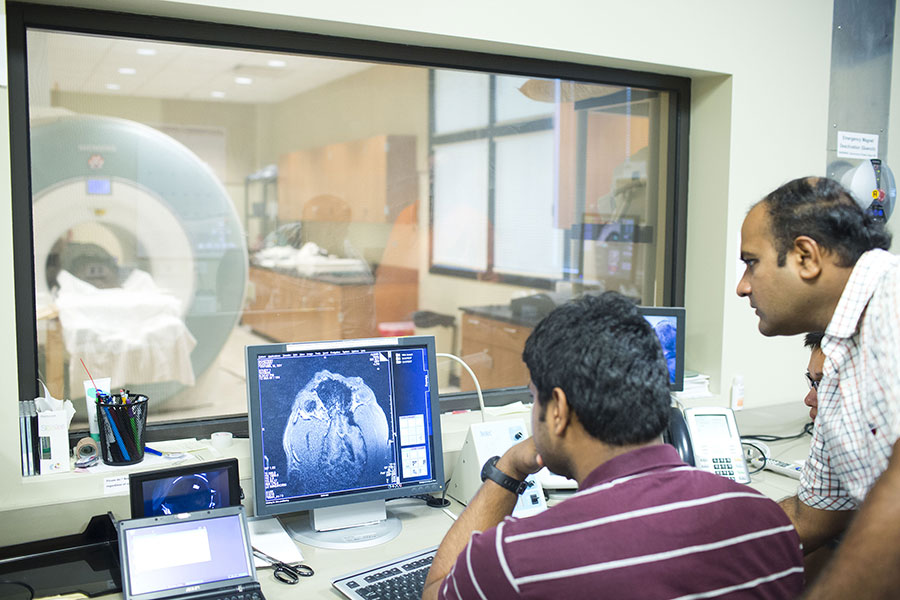Inspire Innovate Transform
Man’s best friend has long been known as the perfect companion. In exchange for food, water, and a pat on the head, a dog will love and defend its owner. Auburn University’s pioneering, collaborative research is enhancing the capabilities of dogs to protect us by their detection of hazardous substances. The Auburn Dog™ is internationally recognized as being of the highest quality and capability for the interdiction of chemical, biological, and explosive threats in airports, train stations, sports arenas, and on city streets.
What makes the Auburn Dog™ stand out among detector dogs? It’s the focus of the university’s multidisciplinary team in scientific investigation and continual improvement of the Auburn Dog™.
“Auburn is using its wealth of research talent and capability across campus to provide a blueprint to breed and train the best detector dogs in the world,” said Paul Waggoner, Canine Performance Sciences program co-director. “Dogs are inherently great detectors thanks to 300 million olfactory receptors, compared to only six million for humans, and the significance of odor in guiding their behavior. We want to maximize the level of protection provided by the dogs’ remarkable sensory capabilities.”
One example of a university-wide collaboration is the use of MRI scanning to noninvasively study dogs’ brain activity to possibly pinpoint—prior to expensive training—whether dogs can become top detectors. Jeff Katz, psychology professor in the College of Liberal Arts, is working with Gopi Deshpande, electrical engineering professor in the Samuel Ginn College of Engineering, and Tom Denney, director of the MRI Research Center, to identify how canine behavior and cognitive abilities are related to brain activity in dogs in the program.
“One of the things we're very much interested in is developing an endophenotype, which is basically looking at behavior and looking at the brains in these dogs to see if we can find predictors early on in their training that will tell us which ones will be a premier dog, a successful dog. And, what dog is not going to be,” Katz said. “This is helpful in identifying not only the best dogs, but also as a cost-saving measure since training these dogs costs thousands of dollars.”
“Auburn is using its wealth of research talent and capability across campus to provide a blueprint to breed and train the best detector dogs in the world.”
In the College of Veterinary Medicine, genetic and genomic research are ongoing in Assistant Professor Xu Wang’s labora¬tory where researchers seek to identify genetic underpinnings of canine behavior, olfaction, cognition, and reproduction. The knowledge gained from these studies will be applied to the breed¬ing of superior detection dogs and to improve canine health in general.
Auburn’s expertise in canine sensor science and technology is widely recognized by government and industry.
 Photo Credit: New York Times
Photo Credit: New York Times
In 2015, Auburn was granted a patent for its Vapor Wake® technology that applies the physics of fluid dynamics in which people in motion leave an aerodynamic plume in their wake. Vapor Wake® dogs can detect hand-carried and body-worn explosives on persons and follow the plume of vapor and chemical particulates entrained in the person’s wake until the target is identified. Auburn’s commercial licensee of Vapor Wake® technology is VWK9 Inc., which trains dogs and handlers in Vapor Wake® detection and provides Vapor Wake® services at many high-visibility, large-event venues, such as today at Jordan-Hare Stadium. The dogs are trained for 15-18 months, compared to only two to four months for standard explosive detection dogs.
“Our collaborative efforts reach far beyond Auburn,” Waggoner said. “We partner with industry and governmental agencies to protect people and critical infrastructure from terrorism around the world.”
Auburn’s research in canine performance also has broader translational scientific, health, and societal impacts that improve the lives of people and animals. The university is providing real-world solutions in helping keep America safe with the Auburn Dog™, the gold standard in canine detection.
